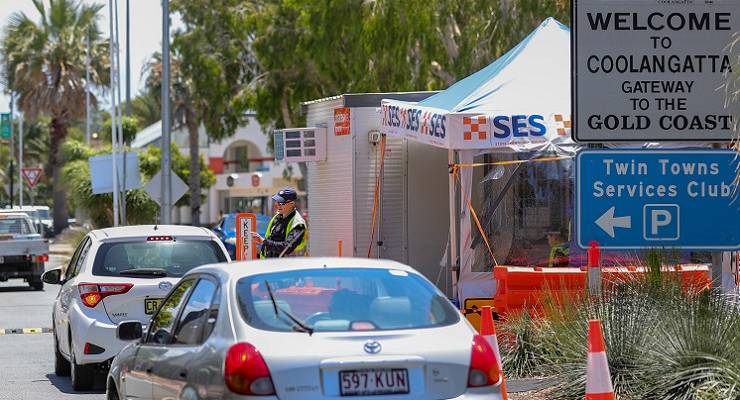
There’s a distinct feeling when you step off a plane in Queensland: the sun glares in your eyes, you feel the humidity on your skin, and you hear cicadas chirping as if they surround you. It’s a feeling many Queenslanders living interstate, myself included, have anticipated with great excitement as we plan to return home for the first time in five months or longer. And finally, after much apprehension, the border is open.
More than 225,000 people have taken up the offer, streaming into the state since it reopened to New South Wales, the ACT and Victoria. But many more are still set to make the journey before Christmas, and border anxiety is real. As COVID worsens, every second spent away from home feels like a ticking time bomb. Every interaction is a new chance to get COVID or be a close contact, every passing day an opportunity for the rules to change again.
Queensland’s cases have been steadily rising, soaring to 186 today. Still, it’s a fraction compared to the 3763 recorded in NSW today or 1503 in Victoria.
Despite this upward trend, signs point to rule changes that will be positive for travellers. Close contact quarantine was cut from 14 days to seven, and state police commissioner Katarina Carroll this morning flagged the requirement to return a negative PCR test three days before travel could be scrapped as early as January 1. Too late for me but a boon to other would-be travellers.
I started writing this article in Sydney nervously awaiting the return of my PCR test, and am completing it from my parent’s house in Brisbane. I am a border-crossing success story, but I am here to report that the process was bloody stressful.
Christmas is cancelled
Just as palpable as the cicadas at Brisbane airport is the anxiety of inbound Queenslanders awaiting COVID test results so they can board their flights or pack their cars and head home. The steps now required to make the trip call for a delicate and complicated balancing act to ward off attacks from all directions.
First up, don’t get COVID. There is more COVID in Australia than ever before, and your chances of catching the virus feel higher than ever thanks to the new super-spreading variant that I refuse to name. But even staying COVID-free won’t save you.
Next up, you need to avoid anyone who wasn’t so successful in dodging the virus. While the close contact rules vary state to state, getting pinged could seriously delay or impact holiday plans.
These likelihoods have led many to retreat to their homes and avoid human contact during what is usually one of the most social times of the year. Fear of the virus failed to keep many at home once lockdowns lifted, but the prospect of a Christmas and New Year’s Eve spent alone is proving just the ticket to an anti-social pre-Christmas period.
Your final challenge is getting a PCR test. Queensland, Tasmania, South Australia and the Northern Territory currently all require travellers from NSW and Victoria to get a negative test in the 72 hours before they enter the respective states.
Sounds simple, but in the rush to return home in the lead up to Christmas, wait times for both receiving the test and the results have dramatically increased in Sydney, Canberra and Melbourne. Even if you have the flexibility to arrive within test centre opening times and queue for hours, there’s no guarantee that the result will arrive in the time you need it.
Rule changes and long delays
There have been reports of tests taking five days to return, with testing centres warning attendees that they can no longer ensure a result within 48 hours. The uncertainty around the new variant and case increases creates a sense of anxiety for anyone with upcoming plans.
When Queensland Premier Annastacia Palaszczuk tweeted on Friday that she had an “important announcement”, Queenslanders feared the worst. My mind immediately went to lockdown, border closure or further restrictions for travellers on arrival. It was actually a mask mandate and the completion of a tunnel, and many expressed their frustration over the word choice that led to the panic.
It could be worse
Western Australia provides the perspective that things could always be worse. I feel deeply for the Western Australians who have long known there was little to no chance of family reunions over these holidays.
Plus, I get to write this having made it home for the holidays. Many are not so lucky. To all the people spending Christmas and/or New Years’ in isolation, I’m sorry. Every single person in this country (except you WA) has undertaken immense sacrifices to get to this point. All we can do is hope that 2022 brings a fresh start and the promise of a year that doesn’t suck.
Have you run into COVID-related trouble while trying to get back home for the holidays? Let us know by writing to letters@crikey.com.au. Please include your full name if you would like to be considered for publication in Crikey’s Your Say column. We reserve the right to edit for length and clarity.








Every single person in this country (except you WA) has undertaken immense sacrifices to get to this point. I beg your bloody pardon?? Plenty of WA folks have made sacrifices for the good of the whole and also whined a whole lot less about it. Your article is a whinge fest from beginning to end!
Agree that it’s a complete whingefest but is in keeping with certain Generations who have all the resilience of a wet paper bag. In the scheme of things, not being able to spend Xmas with your family, while unpleasant, is nothing in the scheme of things. My wife and I are coming up on our second CNY where we are unable to be with our family. Whining achieves nothing.
Try that in Queensland and she is likely to be asked to leave.
Fair enough too.
Ahhh there is always the other perspective. We rotate our Christmas dinners and this year it is in NSW. So far it has be postponed to January.
We all talk regularly on the phone and don’t seem to suffer the anxiety of whingers and Journalist classes.
As one of my southern children is noted to say “Build a bridge and get over it.”
Meanwhile the Perth connections is also very simplistic – “Don’t bother coming we don’t want COVID as they sing – Mark’s me mate.”
Yes I am getting nervous as the South invades our Beautiful Beaches and Clubs, not to mention the shoppers and traffic.
PS All were born in Queensland – to clarify.
It’s really weird that the author makes that stab at WA for not making sacrifices just a couple of sentences after
“Western Australia provides the perspective that things could always be worse. I feel deeply for the Western Australians who have long known there was little to no chance of family reunions over these holidays.”
It’s not possible for both to be true. A final year law and public policy student ought to be capable of mounting a more coherent argument than this.
Your article is a whinge fest from beginning to end!
Glad to see I am not alone and that someone else shared my view. I am really over reading such pieces on a number of the sites I read regularly. Suck it up is my most common muttering – I must be getting old and cranky.
I am already old and cranky! 😉
Its got me beat why the media, as a group, are so anti COVID restriction, and of late, so anti WA. I’m yet to hear an explanation that makes any sense, regardless of how I personally feel about that point of view.
I don’t know why Ms Ganko puts WA in the “things could always be worse” category. There is no COVID here, no restrictions besides the border and nobody is talking about cancelling anything at Christmas.
Hopefully this ‘writer’ will continue in the cloistered halls of academia – the real world would be far too stressful.
I would like to see the reasoning behind letting Omicron rip.
No one is considering what happens if 1 in 3 of our working age people are disabled by Long Covid.
Who will be held responsible when people managing their Covid infections at home start to be found dead on the floor, just as it did in the last wave in Sydney?
“Dom” or some poor overworked GP?
Why does Crikey actually publish rubbish like this? How about real journalism
One must pay for ‘real journalism‘ whereas emo-copy from eager interns on work experience are free.
I too was disappointed by the quality of the article.
The singling out of WA, as missing out shows a real. imbalance. in the reporting.
As a resident living in Western Australia does have its, challenges, however, for the record, we have successfully traded internationally and locally, our supermarket shelves are full, throughout the pandemic, and we don’t have any Border Anxiety. In my opinion, the only anxiety we have is when our borders come down on Feb 5th.
With the exception of the understaffed hospitals, we are stress-free!
We also have relatives in Queensland and planned a mid-December Christmas, it worked out fine. we are safe, and they are safely back in QLD. Christmas is just a date on the calendar, ( most of us do not observe the Christmas rituals) On Christmas day the sun will rise, it will be sunny, HOT IN Perth) wet, snowy, or cold depending on where you live and everyone needs to get on with your life. and plan to be sensible and Stop whingeing
Reality check: in the past two years, Queensland has had 7 deaths from COVID, while NSW has had 645 and Victoria has had 1,460. Closed borders allowed Queenslanders to lead normal and safe lives, and many people here are sick of hearing the hard-luck stories that the tabloid media pump out every day about people stuck on the wrong side of the border. Now the Queensland government has buckled to the tourism industry (could someone ask Daniel Gschwind and Graham Turner how many deaths they are willing to accept for the benefit of their bottom lines?), and Queenslanders will no longer be safe over the holiday period or into next year. WA should hold the line, and people should start holding the NSW government to account for allowing the virus to spread so fast – first the laxity and dilatory half-measures that gave us the mid-2021 Gladys Wave, and now Perrottet’s determination to let rip just when the Omicron variant is taking off. It would be really good if politicians were required to publish the ethical reasoning that allows them to accept X-hundred deaths for X-billion dollars of revenue. I’d like to read that.
The tabloid media, and a couple of Crikey correspondents, call it a tragedy when a grandmother hasn’t seen her grandchild for three months. No, 5.4 million lives cut short, and counting, is tragedy, especially when governments don’t do enough to minimize the loss of life.